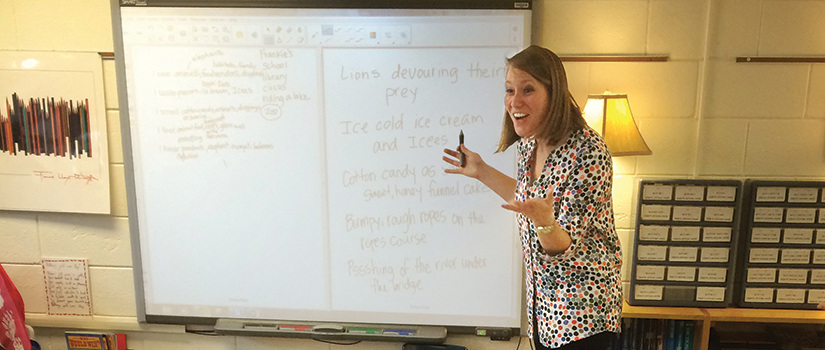Posted May 24, 2016
Story by Dillon Fagler, Reprinted from InterCom
Photo above provided by Alice McMahan. Alice McMahan uses knowledge gleaned from the
MLIS program to teach a poetry lesson at Brockman Elementary.
Obtaining a master’s degree in the library field is a possibility for non-traditional students because of the distributed learning system at USC’s School of Library and Information Science (SLIS). Because of the online nature of the classes, students like Christy Sanford and Alice McMahan have been able to gain degrees despite their absence from campus.
Graduating in 1995 with a Bachelor of Arts in Sociology from USC-Upstate, Sanford entered the business world but found that she would rather be a stay-at-home mom to her two year old. Two kids and a few years later, when her oldest son started school, she started volunteering for the Greenville County Schools as part of the Parent Teacher Association and as a substitute teacher. Almost immediately, she fell in love with library work and decided to go back to school in order to be a school librarian in the Greenville and Spartanburg area. Christy was be able to be at home with her three children while obtaining her master’s degree through the distributed learning program in SLIS.
In 1986, Dr. Daniel Barron, a SLIS professor and later director, created the distributed learning program in order to help students earn a master’s, even if they were not able to physically attend class. Madonna Stoehr, the program coordinator for distributed learning, shared Dr. Barron’s mission. “The specific goal in mind has always been to meet the library and information service needs of the people of South Carolina by educating their librarians—then the other states.”
Today, students can achieve a Master of Library and Information Science (MLIS), or Certificate of Advanced Graduate Study in Library and Information Science. Utilizing computer software like Blackboard, Adobe presenter, and video streams, students can be anywhere in the world and still have the opportunity to interact with other students and professors. The faculty members who run the program frequently update their class material and technology in order to keep the SLIS program current.
The program works on an asynchronous delivery which allows students to access material whenever they have the time. This is much changed from when the program delivered material by television to a synchronous audience.
MLIS candidate Alice McMahan lives in Columbia, South Carolina but loves the flexibility of the online program because it allows her to pack up and spend a few days visiting her grandmother in Florida. Also, due to the online nature of the program, McMahan is able to pursue a leadership development program through her church while having a graduate assistantship with Cocky’s Reading Express. McMahan says, “I am able to fit more hours into my day; I can work on my grad school work at 7 a.m. on a Monday, 2:30 p.m. on a Wednesday, or 10 p.m. on a Friday.” Due to the evolution of technology, SLIS has been able to expand the horizon of the school and now has students internationally.
Sanford and McMahan both chose the SLIS due to the strength of its program and the ease in obtaining a degree in a nontraditional way. Sanford remains enthusiastic, “If it were not for the distance learning opportunity, I would not be able to follow my passion that I discovered later in life.”
